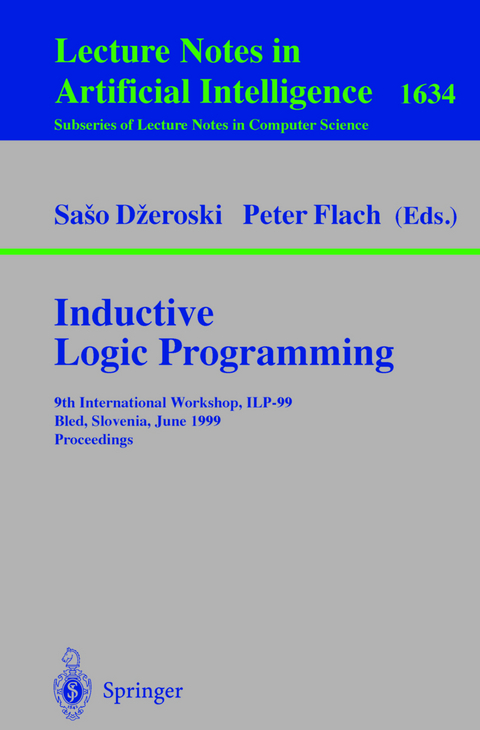Thisvolumecontains3invitedand24submittedpaperspresentedattheNinth InternationalWorkshoponInductiveLogicProgramming,ILP-99. The24acc- tedpaperswereselectedbytheprogramcommitteefromthe40paperssubmitted toILP-99. Eachpaperwasreviewedbythreereferees,applyinghighreviewing standards. ILP-99washeldinBled,Slovenia,24{27June1999. Itwascollocatedwith theSixteenthInternationalConferenceonMachineLearning,ICML-99,held27{ 30June1999. On27June,ILP-99andICML-99weregivenajointinvitedtalk byJ. RossQuinlanandajointpostersessionwhereallthepapersacceptedat ILP-99andICML-99werepresented. TheproceedingsofICML-99(editedby IvanBratkoandSa soD zeroski)arepublishedbyMorganKaufmann. WewishtothankalltheauthorswhosubmittedtheirpaperstoILP-99,the programcommitteemembersandotherreviewersfortheirhelpinselectinga high-qualityprogram,andtheinvitedspeakers:DaphneKoller,HeikkiMannila, andJ. RossQuinlan. ThanksareduetoTanjaUrban ci candherteamandMajda Zidanskiandherteamfortheorganizationalsupportprovided. Wewishtothank AlfredHofmannandAnnaKramerofSpringer-Verlagfortheircooperationin publishing these proceedings. Finally, we gratefully acknowledge the nancial supportprovidedbythesponsorsofILP-99. April1999 Sa soD zeroski PeterFlach ILP-99ProgramCommittee FrancescoBergadano(UniversityofTorino) HenrikBostr om(UniversityofStockholm) IvanBratko(UniversityofLjubljana) WilliamCohen(AT&TResearchLabs) JamesCussens(UniversityofYork) LucDeRaedt(UniversityofLeuven) Sa soD zeroski(Jo zefStefanInstitute,co-chair) PeterFlach(UniversityofBristol,co-chair) AlanFrisch(UniversityofYork) KoichiFurukawa(KeioUniversity) RoniKhardon(UniversityofEdinburgh) NadaLavra c(Jo zefStefanInstitute) JohnLloyd(AustralianNationalUniversity) StanMatwin(UniversityofOttawa) RaymondMooney(UniversityofTexas) StephenMuggleton(UniversityofYork) Shan-HweiNienhuys-Cheng(UniversityofRotterdam) DavidPage(UniversityofLouisville) BernhardPfahringer(AustrianResearchInstituteforAI) CelineRouveirol(UniversityofParis) ClaudeSammut(UniversityofNewSouthWales) MicheleSebag(EcolePolytechnique) AshwinSrinivasan(UniversityofOxford) PrasadTadepalli(OregonStateUniversity) StefanWrobel(GMDResearchCenterforInformationTechnology) OrganizationalSupport TheAlbatrossCongressTouristAgency,Bled Center for Knowledge Transfer in Information Technologies, Jo zef Stefan Institute,Ljubljana SponsorsofILP-99 ILPnet2,NetworkofExcellenceinInductiveLogicProgramming COMPULOGNet,EuropeanNetworkofExcellenceinComputationalLogic Jo zefStefanInstitute,Ljubljana LPASoftware,Inc. UniversityofBristol TableofContents I InvitedPapers ProbabilisticRelationalModels D. Koller . . . . . . . . . . . . . . . . . . . . . . . . . . . . . . . . . . . . . . . . . . . . . . . . . . . . . . . . . . . . . . . . . . 3 InductiveDatabases(Abstract) H. Mannila. . . . . . . . . . . . . . . . . . . . . . . . . . . . . . . . . . . . . . . . . . . . . . . . . . . . . . . . . . . . . . . 14 SomeElementsofMachineLearning(ExtendedAbstract) J. R. Quinlan. . . . . . . . . . . . . . . . . . . . . . . . . . . . . . . . . . . . . . . . . . . . . . . . . . . . . . . . . . . . . . 15 II ContributedPapers Re nementOperatorsCanBe(Weakly)Perfect L. Badea,M. Stanciu. . . . . . . . . . . . . . . . . . . . . . . . . . . . . . . . . . . . . . . . . . . . . . . . . . . . . 21 CombiningDivide-and-ConquerandSeparate-and-ConquerforE cientand E ectiveRuleInduction H. Bostr om,L. Asker. . . . . . . . . . . . . . . . . . . . . . . . . . . . . . . . . . . . . . . . . . . . . . . . . . . . . 33 Re ningCompleteHypothesesinILP I. Bratko. . . . . . . . . . . . . . . . . . . . . . . . . . . . . . . . . . . . . . . . . . . . . . . . . . . . . . . . . . . . . . . . . . 44 AcquiringGraphicDesignKnowledge withNonmonotonicInductiveLearning K. Chiba,H. Ohwada,F. Mizoguchi. . . . . . . . . . . . . . . . . . . . . . . . . . . . . . . . . . . . . . . 56 MorphosyntacticTaggingofSloveneUsingProgol J. Cussens,S. D zeroski,T. Erjavec . . . . . . . . . . . . . . . . . . . . . . . . . . . . . . . . . . . . . .
I Invited Papers.- Probabilistic Relational Models.- Inductive Databases.- Some Elements of Machine Learning.- II Contributed Papers.- Refinement Operators Can Be (Weakly) Perfect.- Combining Divide-and-Conquer and Separate-and-Conquer for Efficient and Effective Rule Induction.- Refining Complete Hypotheses in ILP.- Acquiring Graphic Design Knowledge with Nonmonotonic Inductive Learning.- Morphosyntactic Tagging of Slovene Using Progol.- Experiments in Predicting Biodegradability.- 1BC: A First-Order Bayesian Classifier.- Sorted Downward Refinement: Building Background Knowledge into a Refinement Operator for Inductive Logic Programming.- A Strong Complete Schema for Inductive Functional Logic Programming.- Application of Different Learning Methods to Hungarian Part-of-Speech Tagging.- Combining LAPIS and WordNet for the Learning of LR Parsers with Optimal Semantic Constraints.- Learning Word Segmentation Rules for Tag Prediction.- Approximate ILP Rules by Backpropagation Neural Network: A Result on Thai Character Recognition.- Rule Evaluation Measures: A Unifying View.- Improving Part of Speech Disambiguation Rules by Adding Linguistic Knowledge.- On Sufficient Conditions for Learnability of Logic Programs from Positive Data.- A Bounded Search Space of Clausal Theories.- Discovering New Knowledge from Graph Data Using Inductive Logic Programming.- Analogical Prediction.- Generalizing Refinement Operators to Learn Prenex Conjunctive Normal Forms.- Theory Recovery.- Instance based function learning.- Some Properties of Inverse Resolution in Normal Logic Programs.- An Assessment of ILP-assisted models for toxicology and the PTE-3 experiment.
| Erscheint lt. Verlag |
9.6.1999
|
| Reihe/Serie |
Lecture Notes in Artificial Intelligence
|
Lecture Notes in Computer Science
|
| Zusatzinfo |
VIII, 312 p. |
| Verlagsort |
Berlin |
| Sprache |
englisch |
| Maße |
155 x 235 mm |
| Gewicht |
424 g |
| Themenwelt
|
Mathematik / Informatik ► Informatik ► Betriebssysteme / Server |
| Mathematik / Informatik ► Informatik ► Software Entwicklung |
| Informatik ► Theorie / Studium ► Künstliche Intelligenz / Robotik |
| Schlagworte |
Algorithmic Learning • Data Mining • Hardcover, Softcover / Informatik, EDV/Informatik • HC/Informatik, EDV/Informatik • inductive learning • Inductive Logic Programming • Induktive Logik • Knowledge • Knowledge Discovery • learning • Logic • Logische Programmierung • machine learning • Programmierung • programming • Rule Induction |
| ISBN-10 |
3-540-66109-3 / 3540661093 |
| ISBN-13 |
978-3-540-66109-2 / 9783540661092 |
| Zustand |
Neuware |



